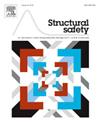System reliability analysis of building clusters considering inter-structural seismic demand correlation
Abstract
The seismic engineering demand parameters (EDPs) of building clusters exhibit significant spatial correlations and need full consideration in regional risk and reliability assessments. This study presents an efficient scheme to determine the joint distribution of multi-structure EDPs, which captures all EDP correlations and enables direct calculation of system reliability for building clusters. This scheme generates spatially correlated random ground motion fields through ground motion cross power spectrum density (PSD) models with stochastic harmonic function simulations. Subsequently, the decoupled multi-probability density evolution method (M−PDEM) is integrated to conduct seismic analysis of building clusters under random ground motion fields to determine their EDP joint distribution. An example of three linear single-degree-of-freedom (SDOF) models shows that the proposed scheme requires only hundreds of analyses to achieve the same accuracy as 105 Monte Carlo Simulation (MCS) analyses, while also capturing the nonlinear correlations among EDPs. Finally, an engineering application of three reinforced concrete (RC) frame shear-wall buildings under a rare earthquake scenario is investigated, and the joint collapse probability by the scheme is compared with that by commonly-adopted assumptions of mutual independence and linear correlation. The results reveal that relative errors by the two assumptions can reach up to 39 % and 22 %, respectively.

 求助内容:
求助内容: 应助结果提醒方式:
应助结果提醒方式:


